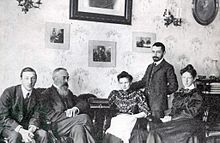 |
| Vladimir Jurowski - photo : Roman Gontcharov, 2017, courtesy IMG Artists |
Vladimir Jurowski conducted the London Philharmonic Orchestra in Rimsky Korsakov, Rachmaninov, Lyadov and Glazunov. Prom 41 worked fine on purely musical terms - satisfying repertoire, by a conductor who excels in this music, though he'd typically spice up the programme with somthing more unusual for his regular Royal Festival Hall audiences, who are more discerning than at the ROyal Albert Hall. When he moves on, he'll be greatly missed. So more's the pity that the BBC Proms team script prioritized the "Henry Wood novelties" marketing gimmick over and above the music and conductor. Henry Wood was a musician not a "brand". He would not have been amused that his name has been used in vain !
He would have beamed, though, at the performance - especially the Glazunov, vividly executed. Again, the stupidity of the BBC Proms team's obsession with fake firsts and non-musical tickboxes. Don't they keep up withn the world outside the Proms ? Glazunov, who died in 1936, was big decades ago, and the more recent revival's been around a good 25 years. Lots of recordings to choose from, too, so there's never really been a drought. Jurowski conducted Glazunov's Symphony no 5 in b flat minor, op 55 (1895), popular and sccessible because it fits the image of Russian music as music for the stage and ballet. The subtitle "heroic" expresses it aptly - plenty of nationalist colour, not a lot of introspection. Jurowski, whose forte is sensitive reflection, emphasized the structural logic behind the drama. A darkly brooding first movement, setting the scene perhaps for the "Russian soul" of public imagination. Wisely, Jurowski focussed on the panorama, long,expansive lines, unfolding like endless horizons. The quality of the LPO playing highlighted details - excellent smaller-unit sections clearly defined. This sharp focus gave the scherzo character - fast passages spiking up the cheerful main theme. The andante was thus framed in context - a calm walking pace threatened by dark, ominous chords. This gave context to the final moveemnt, an allegro, but with powerful, assertive purpose - it's not marked "maestoso" for nothing, it's the culmination of a journey through the earlier movements. Jurowski conducted the animato conclusdion with vigour - the top lines (winds, strings) flying triumphantly over darker undertones (brass, lower strings). Glazunov's Symphony no 5 works perfectly well on its own terms. There's no need to keep referring to its perceived resemblance to other composers. That's lazy thinking - all composers are influenced by others. The skill lies in appreciating what a composer does on his own terms.
Jurowski has conducted Rimsky-Korsakov, Lyadov and Rachmaninov numerous times, so this Prom was enjoyable, although only a fraction of what he can do given more programming choice. A delightful Rimsky-Korsakov Mlada Suite, its ballet origins giving it energy and colour. I liked the way Jurowski and the LPO created the physicality in the ostinato passages - dancers' feet landing on the ground after cheerful dancing. Alexander Ghindin was the soloist in Rachmaninov's Piano Concerto No. 1 in F sharp minor (original version, 1891). Three pieces from Anatoly Lyadov, whom Jurowski has done a lot of in the past, Baba-Yaga, Kikimora and From the Apocalypse. A nice safe programme redeemed by excellent performance. Musicians winning out, despite the suits of BBC formula. .










